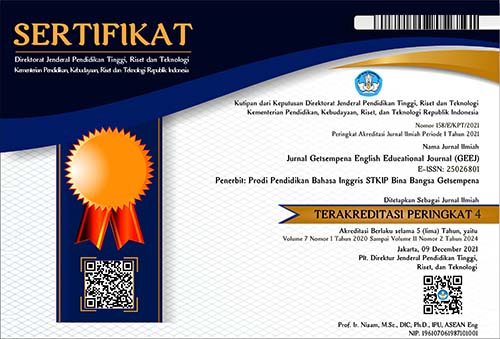STUDENTS’ INVOLVEMENT IN EFL ONLINE CLASSROOM DURING THE COVID-19 PANDEMIC ERA
Abstract
One of the government's policies to stop the spread of the covid-19 pandemic is to shift face-to-face learning at school to distance learning at home. Online learning is not easy to do, it is different from conventional learning. In online classes, students were reluctant to participate in the in-class activities. This kind of reluctance made students lose motivation to learn languages. This study aims to see how the online learning model is to find out the students’ involvement in EFL online classes during the Covid-19 Pandemic at Senior High School in Bengkalis. This present study employs a descriptive case study as the research design. To collect the data, researchers used observation, video documentation, and interviews. Meanwhile, the data analysis technique used in this study were used qualitative data analysis techniques which include three activities, namely: data reduction, data presentation, concluding. The results of this study revealed that. Students could not see the screen display, teacher and student communicating to solve problems, there is a network disruption, students late response to teacher, the class leader is the student who always actively responds to the teacher, students do not respond to teacher directions, students sign in and sign out the zoom meeting
References
Ahsani, E. L. (2020). Strategi Orang Tua dalam Mengajar dan Mendidik Anak dalam Pembelajaran At The Home Masa Pandemi Covid-19. Al Athfal, 3 (1), 37-46.
Ardianti, T. M. (2017). The Role of Teacher And Peer in Helping the Students Orally Participate in An EFL Classroom. Journal of Foreign Language Teaching and Learning, 2, 38-53.
Arikunto, S. (2013). Prosedure Penelitian Suatu Pendekatan Praktik. Jakarta: Rineka Cipta.
Asfiati. (2016). Pendekatan Humanis Dalam Pengembangan Kurikulum (Vol. 3). indonesia: IKAPI.
Carlos Alberto García Sánchez, B. S. (2013). The Impact of Teacher-Student Relationships on EFL Learning. Colombia, 116-129.
Carrie J. Furrer, E. A. (2014). The Influence of Teacher and Peer Relationships on Students’ Classroom Engagement and Everyday Motivational Resilience. National Society For The Study Of Education, 103-104.
Creswell, J. W. (2012). Educational Research. United States of America.: Pearson Education.
Delima, E. M. (2011). A Reticent Student in the Classroom: A Consequence of the Art of Questioning. The Asian EFL Journal, 60, 50-69.
Euis Kurniati, D. K. (2020). Analisis Peran Orang Tua dalam Mendampingi Anak di Masa Pandemi Covid-19. Jurnal Obsesi : Jurnal Pendidikan Anak Usia Dini, 241.
Eva Zygmunt, P. C. (2016). Transfoming Teacher Education for Social Justice. Amsterdam Avenue: Teachers College Press.
Haerudin, Cahyani, A., Sitihanifah, N., Setiani, R. N., Nurhayati, S., Oktaviana, V., & Sitorus, Y. I. (2020). Peran Orangtua dalam Membimbing Anak Selama Pembelajaran di Rumah sebagai Upaya Memutus Covid-19. Universitas Singaperbangsa Karawang, (May), 1–12
Henrichsen, S. J. (2015). Addressing Reticence: The Challenge of Engaging Reluctant Adult ESL Students. Journal of Adult Education, 44, 15-20.
Herburger, D. (2020, May 20). WestEd. Retrieved October 26, 2020, from WestEd: https://www.wested.org/wpcontent/uploads/2020/05/Teacher_Considerations_Distance_Learning_for_Students_with_Disabilities_Final.pdf
Ignatius Rindu, A. (2017). Teacher’s Role in Managing the Class during Teaching and Learning. Script Journal: Journal of Linguistic and English Teaching, 2, 83-100.
Inês Messias, L. M. (2015). Students' engagement in Distance Learning: Creating a scenario with LMS and Social Network aggregation. International Symposium on Computers in Education (SIIE) (pp. 1-6). Lisboa: ResearGate.
Kahu, E. R. (2013). Framing student engagement in higher education. Studies in Higher Education, 38, 758-773.
Kennedy, G. (2020). What is student engagement in online learning... and how do I know when it is there? Melbourne: Melbourne Cshe.
Kim, J. (2013). Influence of group size on students' participation in online discussion forums. Computers & Education, 62, 123-129.
Koran, S. (2015). The Role of Teachers in Developing Learners' Speaking Skill. Conference: 6th International Visible Conference on Educational Studies and Applied Linguistics, 400-416.
Laurillard, D. (2013). ethinking University Teaching:A Conversational Framework for the Effective Use of Learning Technologies. London and Newyork: Psychology Press.
Matthew B. Miles, A. M. (2019). Qualitative Data Analysis A Method Source Book. New Delhi: Sage.
Moleong, L. J. (2010). Metodologi Penelitian Kualitatif. Bandung: Remaja Rosdakarya.
Meyer, K. (2014). Student engagement online: What works and why. New York: ASHE Higher Education Report.
Monica L. Simonsen, M. E. (2017). Student Engagement in Online and Distance Learning. Ann Arbor: MI: XanEdu.
Naserly, M. K. (2020). Implementasi Zoom, Google Classroom, Dan Whatsapp Group Dalam Mendukung Pembelajaran Daring (Online) Pada Mata Kuliah Bahasa Inggris Lanjut. Jurnal Aksara Public, 4, 155–165.
Norziani Dahalan, O. H. (2012). Student Engagement in Online Learning: Learners Attitude Toward E-Mentoring. Procedia - Social and Behavioral Sciences, 67, 464-475.
Permendikbud. (2017). Standar Proses Pendidikan Dasar Dan Menengah.
Rahma Al-Mahrooqi, C. D.-S.-M. (2015). Characteristics of a Good EFL Teacher: Omani EFL Teacher and Student Perspectives. Sage Open, 1-15.
Rodger, J. C. (2014). Approaches and Methods in Language Teaching. Cambridge:: Cambridge University Press.
Rooij, S. W. (2009). Scaffolding project-based learning with the project management body of knowledge (PMBOK (R)). Computers & Education, 52, 210-219.
Sugiyono. (2015). Metode Penelitian Pendidikan Pendekatan Kuantitatif, Kualitatif, dan R&D. Bandung: Alfabeta.
Semiral Öncü, H. C. (2011). Research in online learning environments: Priorities and methodologies. Dblp Computer Science Journals, 57-62.
Teguh, M. (2015). Difusi Inovasi Dalam Program Pembelajaran Jarak Jauh Di Yayasan Trampil Indonesia. Jurnal Ilmiah Scriptura, 5, 7178.
Tuyen, N. V. (2017). Factors That Affect Students’ Reticence in Class. ICEMS. 115, pp. 179-184. Da Nang: Atlis Press.
Villiers, B. D. (2018). The relationship between student engagement and academic success. Journal for New Generation Sciences , 32-50.
Winaya, I. P. (2020). Pendidikan Karakter di Lingkungan Keluarga Selama Pembelajaran Jarak Jauh pada Masa Pandemi COVID-19. Cetta: Jurnal Ilmu Pendidikan, 3, 270-290.
























